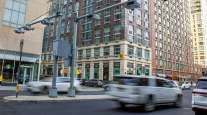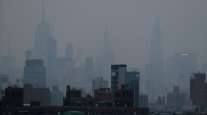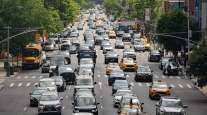Staff Reporter
FHWA Approval Initiates Environmental Assessment for NYC Congestion Pricing Program

[Stay on top of transportation news: Get TTNews in your inbox.]
The Federal Highway Administration on Sept. 7 is expected to initiate an Environmental Assessment associated with a proposed congestion pricing program for the city of New York.
The agency issued a notice of acceptance regarding initiation of the Environmental Assessment in a recent letter to various New York transportation agencies. In April, FHWA determined the assessment was the appropriate next step for the congestion pricing program, which is intended to manage traffic in Manhattan through tolls.
The letter was signed by FHWA New York Division Administrator Richard Marquis and was addressed to leaders representing the New York State Department of Transportation, the New York City Department of Transportation and the Metropolitan Transportation Authority.
FHWA Acceptance of EA Initiation by Transport Topics on Scribd
The program, known as Central Business District Tolling, would include electronic tolling devices posted along the perimeter of midtown and lower Manhattan. Vehicles would be tolled once daily for entering the cordoned area.
Specifically, the Central Business District is defined as the streets south of 60th Street in Manhattan.
“We are delighted that the environmental review process for [Central Business District] tolling has started,” said NYC DOT Commissioner Henry Gutman. “Getting congestion pricing in place quickly is essential for the city’s recovery from the pandemic, as it will help get New Yorkers out of their cars and onto sustainable modes like transit and biking, as well as provide essential funding to modernize and expand our rail and bus systems.”
New York officials estimate the program would generate $15 billion over four years for the MTA to make improvements to the existing system.
Public outreach will be a key part of the Environmental Assessment. According to the MTA, the assessment is expected to take 16 months and include approximately 20 public meetings, as well as outreach efforts directed at environmentally focused communities in New York, New Jersey and Connecticut. The study area represents 22 million people.

Besides the public meetings, the MTA has stated there will be briefings for elected officials, community boards and transit and environmental advocates.
Project partners plan to create a document analyzing the impact of Central Business District Tolling on traffic congestion, transit and air quality.
The Environmental Assessment will rely on about a dozen models and datasets to evaluate impacts to traffic and public transportation for the regional transportation network, which logs 28.8 million journeys per average weekday, 61,000 highway linkage points, 44,267 bus stops or transit stations and 4,170 transit routes, according to the MTA.
Previously, FHWA officials had indicated New York must become part of FHWA’s Value Pricing Pilot Program to be able to set up congestion pricing. Joining this program requires a review under the National Environmental Policy Act.
The Value Pricing Pilot Program is designed to demonstrate whether (and to what extent) roadway congestion may be reduced through congestion pricing strategies.
The MTA plans to hold additional public meetings following the release of the Environmental Assessment so people can comment specifically on the document.
“We will work to accelerate milestones, if possible, as long as engagement with the public and stakeholders is not short-changed and all statutory requirements are met,” Marquis stated in the letter.
Want more news? Listen to today's daily briefing below or go here for more info:




